新建一个新建一个SpringBootTest工程
新建一个HelloController.java文件

1 package com.example.demo; 2 3 import org.springframework.web.bind.annotation.RequestMapping; 4 import org.springframework.web.bind.annotation.RequestMethod; 5 import org.springframework.web.bind.annotation.RestController; 6 7 @RestController 8 public class HelloController { 9 10 @RequestMapping(value = "/hello" , method = RequestMethod.GET) 11 public String say() { 12 return "Hello Spring Boot!"; 13 } 14 }
运行,打开浏览器访问127.0.0.1:8080/hello,输出Hello Spring Boot!
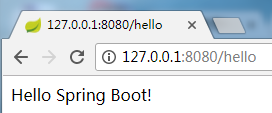
spring boot配置文件的使用
使用.properties格式的配置文件
通过修改配置文件修改访问端口和URL前缀,打开配置文件

添加端口号和URL前缀
server.port=8081
server.context-path=/test
重新运行,可见访问的URl已经发生了改变。
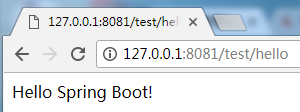
使用yml格式的配置文件
新建一个application.yml的配置文件
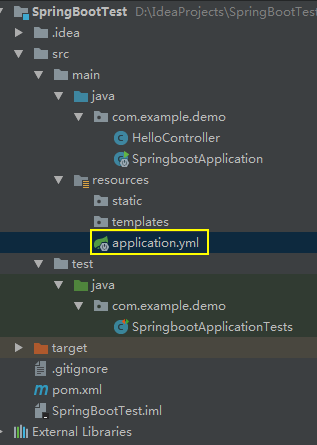
添加端口号和URL前缀
server: port: 8082 context-path: /test
运行,打开浏览器
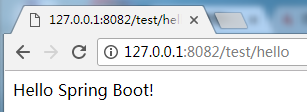
通过配置文件传递值
在application.yml添加一个值testValue
1 server: 2 port: 8082 3 context-path: /test 4 5 6 testValue: I'm test
使用注解的方式在配置文件中取值
1 package com.example.demo; 2 3 import org.springframework.beans.factory.annotation.Value; 4 import org.springframework.web.bind.annotation.RequestMapping; 5 import org.springframework.web.bind.annotation.RequestMethod; 6 import org.springframework.web.bind.annotation.RestController; 7 8 @RestController 9 public class HelloController { 10 11 @Value("${testValue}") 12 private String testValue; 13 14 @RequestMapping(value = "/hello" , method = RequestMethod.GET) 15 public String say() { 16 return testValue; 17 } 18 }
运行,打开浏览器

可以看到配置文件里面的值通过注解的方式传递到了HelloController中的testValue。
配置属性注入类
一个一个值注入比较麻烦,可以使用注入类的方式,一次性将属性注入。
修改配置文件application.yml
1 server: 2 port: 8081 3 context-path: /test 4 5 testValue: I'm test 6 7 people: 8 name: XiaoMing 9 age: 22
修改PeopleProperties.java
1 package com.example.demo; 2 3 import org.springframework.boot.context.properties.ConfigurationProperties; 4 import org.springframework.stereotype.Component; 5 6 //获取注入还需要加一个@Component注解,@ConfigurationProperties(prefix = "people")获取前缀是people的配置 7 @Component 8 @ConfigurationProperties(prefix = "people") 9 public class PeopleProperties { 10 11 private String name; 12 private Integer age; 13 14 15 public void setName(String name) { 16 this.name = name; 17 } 18 public void setAge(Integer age) { 19 this.age = age; 20 } 21 22 public String getName() { return name; } 23 public Integer getAge() { return age; } 24 }
修改HelloController.java
1 package com.example.demo; 2 3 import org.springframework.beans.factory.annotation.Autowired; 4 import org.springframework.web.bind.annotation.RequestMapping; 5 import org.springframework.web.bind.annotation.RequestMethod; 6 import org.springframework.web.bind.annotation.RestController; 7 8 @RestController 9 public class HelloController { 10 11 //自动装配注解 12 @Autowired 13 private PeopleProperties peopleProperties; 14 15 @RequestMapping(value = "/hello" , method = RequestMethod.GET) 16 public String say() { 17 return peopleProperties.getName(); 18 } 19 }
运行,打开浏览器访问输出。

不同的配置文件的切换
我们在实际开发中,常常需要来回来回切换配置,比如经常需要在生产环境和开发环境之间来回切换。
创建三个配置文件application-dev.yml(开发环境配置文件)和application-prod.yml(生产环境配置文件)以及application.yml(默认配置文件)
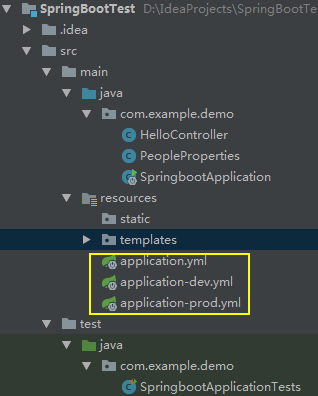
application-dev.yml(开发环境配置文件)
1 server: 2 port: 8081 3 context-path: /test 4 5 testValue: I'm test 6 7 people: 8 name: XiaoMing 9 age: 22
application-prod.yml(生产环境配置文件)
1 server: 2 port: 8082 3 context-path: /test 4 5 testValue: I'm test 6 7 people: 8 name: Li Lei 9 age: 3
如果我们使用开发环境的配置时
application.yml(默认配置文件),active设置为dev
1 spring: 2 profiles: 3 active: dev
运行,访问本地8081端口
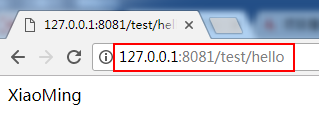
如果我们使用开发环境的配置时
application.yml(默认配置文件),active设置为prod
1 spring:
2 profiles:
3 active: prod
运行,访问本地8082端口
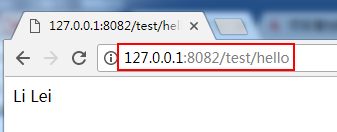
这样只需修改默认配置文件application.yml就可以实现不同配置的来回切换了